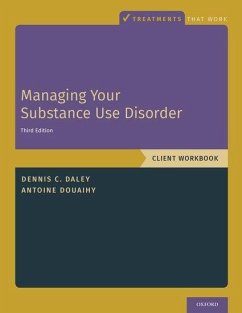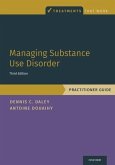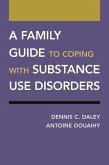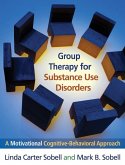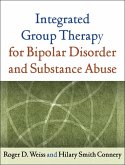- Broschiertes Buch
- Merkliste
- Auf die Merkliste
- Bewerten Bewerten
- Teilen
- Produkt teilen
- Produkterinnerung
- Produkterinnerung
The third edition of Managing Your Substance Use Disorder provides the reader with practical information and skills to help them understand and change a drug or alcohol problem.
Andere Kunden interessierten sich auch für
![Managing Substance Use Disorder Managing Substance Use Disorder]() DaleyManaging Substance Use Disorder86,99 €
DaleyManaging Substance Use Disorder86,99 €![A Family Guide to Coping with Substance Use Disorders A Family Guide to Coping with Substance Use Disorders]() Dennis C DaleyA Family Guide to Coping with Substance Use Disorders42,99 €
Dennis C DaleyA Family Guide to Coping with Substance Use Disorders42,99 €![Group Therapy for Substance Use Disorders Group Therapy for Substance Use Disorders]() Linda Carter SobellGroup Therapy for Substance Use Disorders54,99 €
Linda Carter SobellGroup Therapy for Substance Use Disorders54,99 €![Concurrent Treatment of Ptsd and Substance Use Disorders Using Prolonged Exposure (Cope) Concurrent Treatment of Ptsd and Substance Use Disorders Using Prolonged Exposure (Cope)]() Sudie E BackConcurrent Treatment of Ptsd and Substance Use Disorders Using Prolonged Exposure (Cope)100,99 €
Sudie E BackConcurrent Treatment of Ptsd and Substance Use Disorders Using Prolonged Exposure (Cope)100,99 €![Integrated Group Therapy for Bipolar Disorder and Substance Abuse Integrated Group Therapy for Bipolar Disorder and Substance Abuse]() Roger D WeissIntegrated Group Therapy for Bipolar Disorder and Substance Abuse51,99 €
Roger D WeissIntegrated Group Therapy for Bipolar Disorder and Substance Abuse51,99 €![Managing Social Anxiety, Workbook Managing Social Anxiety, Workbook]() Debra A HopeManaging Social Anxiety, Workbook68,99 €
Debra A HopeManaging Social Anxiety, Workbook68,99 €![Managing Social Anxiety, Therapist Guide Managing Social Anxiety, Therapist Guide]() Debra A HopeManaging Social Anxiety, Therapist Guide76,99 €
Debra A HopeManaging Social Anxiety, Therapist Guide76,99 €-
-
-
The third edition of Managing Your Substance Use Disorder provides the reader with practical information and skills to help them understand and change a drug or alcohol problem.
Hinweis: Dieser Artikel kann nur an eine deutsche Lieferadresse ausgeliefert werden.
Hinweis: Dieser Artikel kann nur an eine deutsche Lieferadresse ausgeliefert werden.
Produktdetails
- Produktdetails
- Verlag: Hurst & Co.
- 3rd edition
- Seitenzahl: 192
- Erscheinungstermin: 4. Oktober 2019
- Englisch
- Abmessung: 277mm x 213mm x 10mm
- Gewicht: 499g
- ISBN-13: 9780190926670
- ISBN-10: 0190926678
- Artikelnr.: 56870562
- Herstellerkennzeichnung
- Produktsicherheitsverantwortliche/r
- Europaallee 1
- 36244 Bad Hersfeld
- gpsr@libri.de
- Verlag: Hurst & Co.
- 3rd edition
- Seitenzahl: 192
- Erscheinungstermin: 4. Oktober 2019
- Englisch
- Abmessung: 277mm x 213mm x 10mm
- Gewicht: 499g
- ISBN-13: 9780190926670
- ISBN-10: 0190926678
- Artikelnr.: 56870562
- Herstellerkennzeichnung
- Produktsicherheitsverantwortliche/r
- Europaallee 1
- 36244 Bad Hersfeld
- gpsr@libri.de
Dennis C. Daley, PhD, is Senior Clinical Director of Substance Use Services in the Behavioral Health Integration Division at the University of Pittsburgh Medical Center Insurance Division. He is also a Professor of Psychiatry at the University of Pittsburgh School of Medicine. Dr. Daley has been involved in clinical care, research, and teaching about addiction for nearly 40 years, and has been an investigator, consultant and trainer on numerous local and national studies funded by NIDA or NIAAA. One of the first experts in the US to publish interactive workbooks on recovery from addiction or co-occurring psychiatric disorders, Dr. Daley has advocated for decades for recovery for individuals and families affected by addiction, or co-occurring disorders. He also shares personal experiences dealing with addiction in his own family. Antoine Douaihy, MD, is Professor of Psychiatry and Medicine, Senior Academic Director of Addiction Medicine Services and Addiction Psychiatry Fellowship at Western Psychiatric Hospital of the University of Pittsburgh Medical Center (UPMC), and Co-Director of the Tobacco Treatment Service of UPMC. His areas of clinical and research expertise are substance use disorders (SUDs) and SUDs co-occurring with psychiatric disorders in adults and adolescents, psychosocial interventions for the treatment of SUDs, smoking cessation, psychology of behavior change, and motivational interviewing. His research has been funded by NIAAA, NIDA, NIMH, SAMHSA, HRSA, and pharmaceutical companies.
Overview of Substance Use Problems and Assessment
Chapter 1: Introduction and Plan for This Workbook
Chapter 2: Recognizing Your Substance Use Problem
Chapter 3: Recognizing Consequences of Your Substance Use
Change Issues and Strategies
Chapter 4: Treatment Settings for Substance Use Problems
Chapter 5: Stages of Change
Chapter 6: How to Use Therapy or Counseling
Chapter 7: Overview of Goal Planning
Chapter 8: Managing Cravings and Urges to Use Substances
Chapter 9: Managing Thoughts of Using Substances
Chapter 10: Managing Emotions
Chapter 11: Refusing Offers to Use Substances
Chapter 12: Dealing With Family and Interpersonal Problems
Chapter 13: Building a Recovery Support System
Chapter 14: Mutual Support Programs and Recovery Clubs
Chapter 15: Medications for Substance Use Disorders
Relapse Prevention, Progress Measurement, and Co-occurring Psychiatric Disorders
Chapter 16: Relapse Prevention: Reducing the Risk of Relapse
Chapter 17: Relapse Management: What to Do if You Lapse or Relapse
Chapter 18: Strategies for Balanced Living
Chapter 19: Measuring Your Progress
Chapter 20: Managing a Co-occurring Psychiatric Disorder
Appendix
References and Suggested Readings
About the Authors
Chapter 1: Introduction and Plan for This Workbook
Chapter 2: Recognizing Your Substance Use Problem
Chapter 3: Recognizing Consequences of Your Substance Use
Change Issues and Strategies
Chapter 4: Treatment Settings for Substance Use Problems
Chapter 5: Stages of Change
Chapter 6: How to Use Therapy or Counseling
Chapter 7: Overview of Goal Planning
Chapter 8: Managing Cravings and Urges to Use Substances
Chapter 9: Managing Thoughts of Using Substances
Chapter 10: Managing Emotions
Chapter 11: Refusing Offers to Use Substances
Chapter 12: Dealing With Family and Interpersonal Problems
Chapter 13: Building a Recovery Support System
Chapter 14: Mutual Support Programs and Recovery Clubs
Chapter 15: Medications for Substance Use Disorders
Relapse Prevention, Progress Measurement, and Co-occurring Psychiatric Disorders
Chapter 16: Relapse Prevention: Reducing the Risk of Relapse
Chapter 17: Relapse Management: What to Do if You Lapse or Relapse
Chapter 18: Strategies for Balanced Living
Chapter 19: Measuring Your Progress
Chapter 20: Managing a Co-occurring Psychiatric Disorder
Appendix
References and Suggested Readings
About the Authors
Overview of Substance Use Problems and Assessment
Chapter 1: Introduction and Plan for This Workbook
Chapter 2: Recognizing Your Substance Use Problem
Chapter 3: Recognizing Consequences of Your Substance Use
Change Issues and Strategies
Chapter 4: Treatment Settings for Substance Use Problems
Chapter 5: Stages of Change
Chapter 6: How to Use Therapy or Counseling
Chapter 7: Overview of Goal Planning
Chapter 8: Managing Cravings and Urges to Use Substances
Chapter 9: Managing Thoughts of Using Substances
Chapter 10: Managing Emotions
Chapter 11: Refusing Offers to Use Substances
Chapter 12: Dealing With Family and Interpersonal Problems
Chapter 13: Building a Recovery Support System
Chapter 14: Mutual Support Programs and Recovery Clubs
Chapter 15: Medications for Substance Use Disorders
Relapse Prevention, Progress Measurement, and Co-occurring Psychiatric Disorders
Chapter 16: Relapse Prevention: Reducing the Risk of Relapse
Chapter 17: Relapse Management: What to Do if You Lapse or Relapse
Chapter 18: Strategies for Balanced Living
Chapter 19: Measuring Your Progress
Chapter 20: Managing a Co-occurring Psychiatric Disorder
Appendix
References and Suggested Readings
About the Authors
Chapter 1: Introduction and Plan for This Workbook
Chapter 2: Recognizing Your Substance Use Problem
Chapter 3: Recognizing Consequences of Your Substance Use
Change Issues and Strategies
Chapter 4: Treatment Settings for Substance Use Problems
Chapter 5: Stages of Change
Chapter 6: How to Use Therapy or Counseling
Chapter 7: Overview of Goal Planning
Chapter 8: Managing Cravings and Urges to Use Substances
Chapter 9: Managing Thoughts of Using Substances
Chapter 10: Managing Emotions
Chapter 11: Refusing Offers to Use Substances
Chapter 12: Dealing With Family and Interpersonal Problems
Chapter 13: Building a Recovery Support System
Chapter 14: Mutual Support Programs and Recovery Clubs
Chapter 15: Medications for Substance Use Disorders
Relapse Prevention, Progress Measurement, and Co-occurring Psychiatric Disorders
Chapter 16: Relapse Prevention: Reducing the Risk of Relapse
Chapter 17: Relapse Management: What to Do if You Lapse or Relapse
Chapter 18: Strategies for Balanced Living
Chapter 19: Measuring Your Progress
Chapter 20: Managing a Co-occurring Psychiatric Disorder
Appendix
References and Suggested Readings
About the Authors

